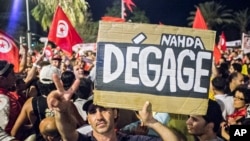ຊາວຕູນີເຊຍ ຫຼາຍພັນຄົນ ໄດ້ພາກັນເດີນຂະບວນຜ່ານເມືອງຫຼວງຂອງພວກເຂົາເຈົ້າເມື່ອວັນເສົາວານນີ້ ຮຽກຮ້ອງໃຫ້ລັດຖະບານທີ່ນໍາໂດຍພວກ ຫົວສາສະໜາອິສລາມ ລາອອກ ຂະນະທີ່ວິກິດການການເມືອງຂອງປະເທດ ກໍາລັງຮ້າຍແຮງຂຶ້ນນັບມື້ນັ້ນ.
ການລອບສັງຫານນັກການເມືອງຝ່າຍຄ້ານຄົນນຶ່ງ ເມື່ອເດືອນກໍລະກົດຜ່ານມາ ຊຶ່ງເປັນ
ຄັ້ງທີ່ສອງໃນໄລຍະຫົກເດືອນ ໄດ້ແບ່ງແຍກປະເທດ ອອກເປັນຫລາຍຝ່າຍ.
ການເດີນຂະບວນດັ່ງກ່າວ ເປັນຈຸດສຸດຍອດຂອງການປະທ້ວງມາໄດ້ນຶ່ງ ອາທິດ ເພື່ອຮຽກຮ້ອງໃຫ້ລັດຖະບານລາອອກ ແລະໃຫ້ຍຸບສະພາທີ່ຖືກເລືອກຕັ້ງໃນປີ 2011 ເພື່ອຮ່າງລັດຖະທໍາມະນູນໃໝ່.
ຊາວຕູນີເຊຍ ໄດ້ໂຄ່ນລົ້ມຈອມຜະເດັດການຂອງພວກເຂົາເຈົ້າ ໃນເດືອນ ມັງກອນ ປີ 2011 ແລະໄດ້ກະຕຸ້ນໃຫ້ມີການເດີນຂະບວນປະທ້ວງເພື່ອປະຊາທິປະໄຕ ດັ່ງທີ່ເອີ້ນກັນວ່າ ລະດູບານໃໝ່ຂອງໂລກອາຫຣັບ ຫຼື Arab Spring ຢູ່ທົ່ວຂົງເຂດນັ້ນ.
ລັດຖະບານໄດ້ຖິ້ມໂທດການລອບສັງຫານໃສ່ພວກຫົວຮຸນແຮງອີສລາມ ແລະໄດ້ສະເໜີແຜນທີ່ເສັ້ນທາງ ໄປສູ່ການຮ່າງລັດຖະທໍາມະນູນໃຫ້ສໍາເລັດ ແລະເລືອກຕັ້ງເອົາສະມາຊິກສະພາແລະປະທານາທິບໍດີ ແຕ່ກໍບໍ່ໄດ້ເຮັດໃຫ້ພວກປະທ້ວງຢຸດແຕ່ຢ່າງໃດ.
ຜູ້ປະທ້ວງ Kawthar Masraoui ເວົ້າວ່າ:
“ພວກລັດຖະບານຕ້ອງເຂົ້າໃຈດີ ແລະຕ້ອງລາອອກ. ມັນຈົບແລ້ວສໍາລັບ
ພວກເຂົາເຈົ້າ. ຊາວຕູນີເຊຍເບື່ອໜ່າຍພັກ Ennahda ແລະການປົກຄອງ
ຂອງພວກເຂົາ. ມັນພໍແລ້ວ ພໍແລ້ວ. ພວກເຮົາໝົດຄວາມອົດທົນແລ້ວ.”
ບໍ່ຄືກັນກັບຢູ່ອີຈິບ ບ່ອນທີ່ຝ່າຍທະຫານໄດ້ໂຄ່ນລົ້ມລັດຖະບານອິສລາມທີ່ ຖືກເລືອກຕັ້ງ ການຜັນປ່ຽນຂອງຕູນີເຊຍນັ້ນ ໄດ້ມີການປານີປານອມກັນ ລະຫວ່າງພວກທີ່ມີບົດບາດທາງການເມືອງ ຊຶ່ງໄດ້ຮັກສາຂັ້ນຕອນການຜັນປ່ຽນໄວ້ ໃຫ້ກ້າວເດີນຕໍ່ໄປ.
ເບິ່ງວີດີໂອ:
Thousands of Tunisians marched through their capital Saturday, calling for the Islamist-led government to resign as the nation’s political crisis deepens.
The assassination of an opposition politician in July - the second in six months - has polarized the country.
The march was the culmination of a week of protests, calling for the resignation of the government and the dissolution of the assembly elected in 2011 to write the constitution.
Tunisians overthrew their dictator in January 2011, kicking off pro-democracy demonstrations of the so-called Arab Spring around the region.
The government has blamed the assassinations on Islamist extremists and has offered a "roadmap" to finish the constitution and hold legislative and presidential elections. But that did nothing to pacify the protesters.
"They have to understand and resign. It's over now. Tunisian people are fed up of Ennahda and it's regime. It's enough - enough. We have reached the end of our patience."
Unlike in Egypt, where a military coup toppled an elected Islamist government, Tunisia’s transition has been marked by a pattern of compromises between political actors that has kept the process on track.
ການລອບສັງຫານນັກການເມືອງຝ່າຍຄ້ານຄົນນຶ່ງ ເມື່ອເດືອນກໍລະກົດຜ່ານມາ ຊຶ່ງເປັນ
ຄັ້ງທີ່ສອງໃນໄລຍະຫົກເດືອນ ໄດ້ແບ່ງແຍກປະເທດ ອອກເປັນຫລາຍຝ່າຍ.
ການເດີນຂະບວນດັ່ງກ່າວ ເປັນຈຸດສຸດຍອດຂອງການປະທ້ວງມາໄດ້ນຶ່ງ ອາທິດ ເພື່ອຮຽກຮ້ອງໃຫ້ລັດຖະບານລາອອກ ແລະໃຫ້ຍຸບສະພາທີ່ຖືກເລືອກຕັ້ງໃນປີ 2011 ເພື່ອຮ່າງລັດຖະທໍາມະນູນໃໝ່.
ຊາວຕູນີເຊຍ ໄດ້ໂຄ່ນລົ້ມຈອມຜະເດັດການຂອງພວກເຂົາເຈົ້າ ໃນເດືອນ ມັງກອນ ປີ 2011 ແລະໄດ້ກະຕຸ້ນໃຫ້ມີການເດີນຂະບວນປະທ້ວງເພື່ອປະຊາທິປະໄຕ ດັ່ງທີ່ເອີ້ນກັນວ່າ ລະດູບານໃໝ່ຂອງໂລກອາຫຣັບ ຫຼື Arab Spring ຢູ່ທົ່ວຂົງເຂດນັ້ນ.
ລັດຖະບານໄດ້ຖິ້ມໂທດການລອບສັງຫານໃສ່ພວກຫົວຮຸນແຮງອີສລາມ ແລະໄດ້ສະເໜີແຜນທີ່ເສັ້ນທາງ ໄປສູ່ການຮ່າງລັດຖະທໍາມະນູນໃຫ້ສໍາເລັດ ແລະເລືອກຕັ້ງເອົາສະມາຊິກສະພາແລະປະທານາທິບໍດີ ແຕ່ກໍບໍ່ໄດ້ເຮັດໃຫ້ພວກປະທ້ວງຢຸດແຕ່ຢ່າງໃດ.
ຜູ້ປະທ້ວງ Kawthar Masraoui ເວົ້າວ່າ:
“ພວກລັດຖະບານຕ້ອງເຂົ້າໃຈດີ ແລະຕ້ອງລາອອກ. ມັນຈົບແລ້ວສໍາລັບ
ພວກເຂົາເຈົ້າ. ຊາວຕູນີເຊຍເບື່ອໜ່າຍພັກ Ennahda ແລະການປົກຄອງ
ຂອງພວກເຂົາ. ມັນພໍແລ້ວ ພໍແລ້ວ. ພວກເຮົາໝົດຄວາມອົດທົນແລ້ວ.”
ບໍ່ຄືກັນກັບຢູ່ອີຈິບ ບ່ອນທີ່ຝ່າຍທະຫານໄດ້ໂຄ່ນລົ້ມລັດຖະບານອິສລາມທີ່ ຖືກເລືອກຕັ້ງ ການຜັນປ່ຽນຂອງຕູນີເຊຍນັ້ນ ໄດ້ມີການປານີປານອມກັນ ລະຫວ່າງພວກທີ່ມີບົດບາດທາງການເມືອງ ຊຶ່ງໄດ້ຮັກສາຂັ້ນຕອນການຜັນປ່ຽນໄວ້ ໃຫ້ກ້າວເດີນຕໍ່ໄປ.
ເບິ່ງວີດີໂອ:
Thousands of Tunisians marched through their capital Saturday, calling for the Islamist-led government to resign as the nation’s political crisis deepens.
The assassination of an opposition politician in July - the second in six months - has polarized the country.
The march was the culmination of a week of protests, calling for the resignation of the government and the dissolution of the assembly elected in 2011 to write the constitution.
Tunisians overthrew their dictator in January 2011, kicking off pro-democracy demonstrations of the so-called Arab Spring around the region.
The government has blamed the assassinations on Islamist extremists and has offered a "roadmap" to finish the constitution and hold legislative and presidential elections. But that did nothing to pacify the protesters.
"They have to understand and resign. It's over now. Tunisian people are fed up of Ennahda and it's regime. It's enough - enough. We have reached the end of our patience."
Unlike in Egypt, where a military coup toppled an elected Islamist government, Tunisia’s transition has been marked by a pattern of compromises between political actors that has kept the process on track.






